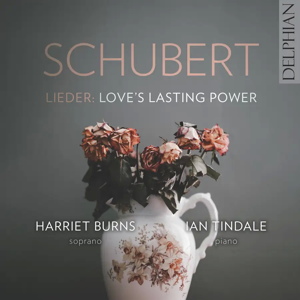
Franz Schubert (1797–1828)
Lieder: Love’s Lasting Power
Harriet Burns (soprano), Ian Tindale (piano)
rec. 2023, St. Mary’s Parish Church, Haddington, UK
Notes, sung texts and translations included.
Delphian DCD34251 [68]
The English soprano, Harriet Burns, still in her early 30s, has been getting some great reviews in the music press of late, some of them for this recital of Schubert Lieder, and indeed there is a great deal to celebrate here. She and her accompanist, Ian Tindale, were recent winners of the Contemporary Song Prize in the International Vocal Competition at ‘s-Hertogenbosch and this is their debut recital. They have put together a group of Schubert Lieder on the subject of love in all its guises, from, as the notes tell us, “many-splendoured and joyous to tragic and rejected.” Some of the songs will be familiar, some maybe less so, but it is a very well-considered and thoughtful programme.
First impressions are of the sheer beauty of Burns’ voice, which is a full, lyric soprano. Its creamy richness would no doubt be perfect for Strauss’s soaring soprano lines, and I see she is soon to add the Vier letzte Lieder to her repertoire, though initially in a recital with piano accompaniment. I would also highlight her musicality and her thoughtful response to the text, though here I would appreciate crisper diction. Sometimes the words are not clear enough. However, all in all, there is a great deal of pleasure to be derived from this recital and I thoroughly enjoyed it.
That said, when getting a little more specific in my listening, one or two doubts started to creep in. Take for example the longest song on the disc, Viola. This song, which is almost 13 minutes long, is in the nature of a mini-scena, its many changes of attitude signposted by the accompaniment and masterfully managed by Tindale. These changes of mood cry out for a change of colour or attitude from the singer but Burns rarely responds accordingly and when one turns to the same song as sung by Anne Sofie von Otter, it is to hear a much more specific response to the text and the accompaniment.
Comparisons are invidious, but perhaps inevitable, and it was the same story with most of the other songs I sampled in different performances. I would like more characterisation and personality in Die Männer sind méchant and that is what we get from, for instance, Lotte Lehmann and Janet Baker. There is also much more complexity to be found in Suleika I. Though the sounds of nature depicted in the poem are gentle and reassuring they don’t quell the anxiety in the poet’s heart in the absence of his lover. We hear this in the accompaniment, and we hear it in the voice of Janet Baker, but not in the voice of Burns.
I sampled a few more versions of one of the most well-known songs here Der Jüngling and der Quelle and it was to find that Elisabeth Schumann, Lottle Lehmann, Elisabeth Schwarzkopf, Elly Ameling and Lucia Popp are all more communicative with the text and much more specific in their response to it. Burns is beautiful, expressive, but more generalised and this is the only criticism I have of a recital which is, in all other respects, more than promising from an artist, who is no doubt still developing.
The final song is Seligkeit, one of those songs which is often taken much too fast, but for which she and Tindale find the perfect tempo here. Burns is delightful, responding well to its note of blithely carefree happiness. A perfect way to end a highly enjoyable recital. Both soprano and accompanist are clearly ones to watch.
Philip Tsaras
www.tsaraslondon.com
Help us financially by purchasing from


Contents
Die Liebe (Freudvoll und leidvoll), D210
Lachen und Weinen, D777
Die Männer sind méchant, D866 No. 3
Dass sie hier gewesen, D775
Suleika I, D720
Wiedersehen, D855
Heimliches Lieben, D922
Versunken, D715
Ernster Verlust, D226
Amalia, D195
Lambertine, D301
Die Liebe hat gelogen, D751
Am mein Herz, D860
Der Jüngling an der Quelle, D300
Der Zwerg, D777
Hippolits Lied, D890
Du liebst mich nicht, D756
Viola, D786
Geheimnis, D491
Seligkeit, D433

















